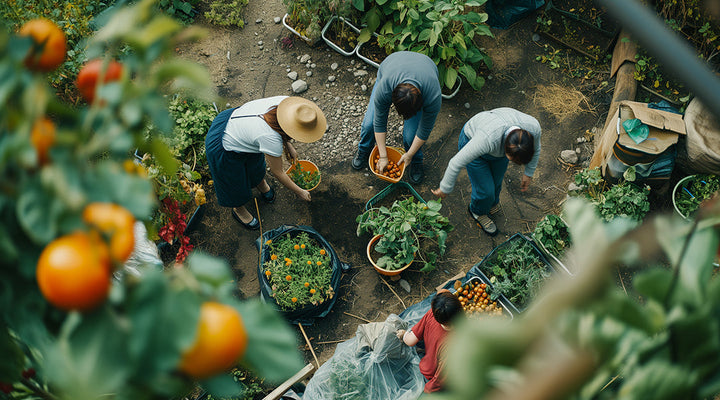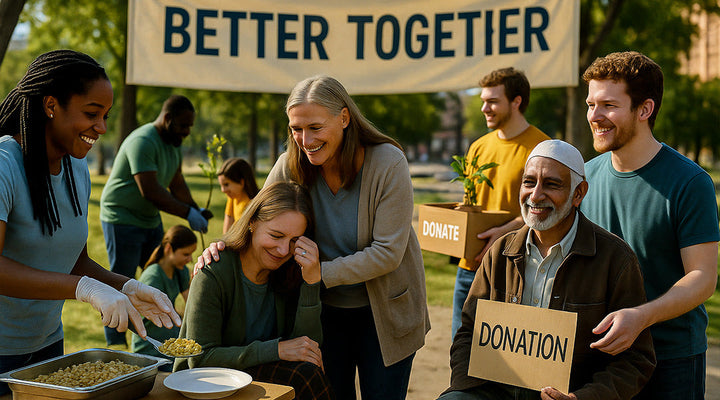
Individual Commitment Leads To Global Impact - How Healthy Coffee And A Healthy Planet Go Hand And Hand
Would you agree that we have a responsibility to protect and preserve land/soil/forests across the globe?
What about the air we breathe? Do you think minimizing air pollution is important?
What about the earth’s lakes, rivers, oceans, and other waterways - cleaning these natural resources is needed as well, right?
The mission to protect our planet is monumental, a task that requires global attention, and this challenge is what drives the creation of organizations and initiatives such as World Environment Day.
The thing is, unless these global initiatives become personal, their impact may be limited.
Oftentimes the organization of such ‘days’ serves to challenge businesses and governments, calling on these entities to do their part in protecting our planet, concentrating on matters such as preservation, sustainability, and more.
But, while these steps are truly vital, even the greatest global impacts will fall flat without individual commitment.
So, this year for World Environment Day, we’d like to take a look at the impact of sustainability on planetary health with you in mind!
That’s right, today we’re talking about real, lasting impacts that you can make for a better planet and a better future.
I know, this sounds like a daunting task, but like most things pertaining to health (yes, even environmental health), little becomes much when we commit together!
World Environment Day And Sustainability

World Environment Day is a global day dedicated to environmental outreach, with some even describing it as the biggest international day for the environment.
Beginning in 1973, led by the United Nations Environment Program, World Environment Day joins the hearts and hands of millions across the globe with one aim, one goal, and one incredibly important task - safeguarding and restoring our planet.
Each year on June 5th World Environment Day “engages a vast global audience across more than 150 countries in tackling today’s most pressing environmental challenges.”
And, typically each year is celebrated by highlighting a specific environmental need.
For instance,
- In 2024, World Environment Day put a spotlight on efforts surrounding land restoration.
- In 2023, efforts were focused on solutions to plastic pollution.
- In 2020, the urgency of biodiversity was a pivotal theme.
And, in earlier years, focal points for this day ranged from protecting natural habitats to cleaning groundwater, soil degradation, hazardous waste disposal, continued sustainability, and more.
This year, specifically, plastic pollution is once again a theme of focus, but within this measure lies not only a greater theme, but a thread running through all environmental protection and preservation efforts - sustainability.
Whether we realize it or not, sustainability is a part of everyday life.
Folks seeking to lose weight or implement a change regarding their dietary habits must consider sustainability - is this method, diet, or way of eating something that can be sustained long term?
We may abruptly learn a lesson in sustainability when it comes to sleep after several late nights spent working or binging a new favorite series, realizing quickly that such interruptions in sleep aren’t sustainable.
Or, folks can often realize the importance of sustainability in regard to spending habits when weekend splurges showcase the need for restraint after a careful overview of the checkbook.
These examples are common in many lives and households, but I dare say we rarely realize these as a lesson in sustainability.
You see, sustainability simply refers to the maintenance of a thing, the ability to maintain something over time.
Of course, we understand avoiding sleep to make time for work isn’t something that will last long without dire consequences.
And, we understand taking part in a water fast for a week or two isn’t something that can be maintained over long periods either.
But for some reason, when it comes to the environment, it seems the notion of sustainability is more difficult to grasp.
In fact, could it be that many folks simply don’t realize the impact a lack of sustainability has on our planet.
And, this is why global efforts are needed.

World Environment Day and similar planetary-focused initiatives bring to light not only the importance of preservation and protection, but they also highlight those specific practices which need improvement.
Take this year’s focus on plastic pollution, for instance. It seems to be apparent, in years’ past, sustainability was an afterthought regarding the widespread use of plastic.
Had this been a central focus, mainly noting how such a product, packaging material, and more would accumulate through global use, then perhaps our planet wouldn’t be facing such a dire issue regarding clean-up today.
Of course, World Environment Day serves to call on businesses and governments across the globe to join in efforts towards a solution to this problem, but in reality, global impact cannot take place without individual commitment.
Concerning plastic use, as individuals, our role seems simple - reduce, reuse, and recycle.
Or, practically speaking - find sustainable alternatives to plastic, use less plastic, and recycle what plastics you find to be unavoidable at this time.
Ah, but clearly, plastic use only scratches the surface.
Sustainability is a concern across all environmental protection and preservation efforts, each of which, as we’ve already stated, require individual commitment to make a global impact.
So, with that in mind, let’s take a look at some ways you can positively impact the environment right where you’re at…
Tackling Today’s Environmental Challenges At Home
Many organizations, communities, and institutions put out mission statements reaffirming their goals regarding a commitment to environmental protection near World Environment Day.
In doing so, such businesses, colleges, etc. call on folks to commit individually, recognizing what we sought to highlight above, namely the importance of personal change and dedication to sustainability.
For instance, Mont Rose College in the UK offered the following commitment statement last year: “I will strive to make sustainable use of our natural environment so that no species will be threatened or disappear because of my actions…”
I used this statement because it focuses on the impact each one of us can make when we join together surrounding a greater commitment to environmental sustainability.
So then, what can you do to celebrate World Environment Day (everyday)? More specifically, what can you do to sustainably impact the health of our planet?
1- Water And Energy Conservation

Utilize rainwater to keep your garden healthy and hydrated.
Be mindful of water and electricity usage in your home, and turn off lights, electronics, and faucets when not in use.
2- Reduce, Reuse, Recycle
We seem to have eased into a one and done society, buying products enmasse and flippantly trashing items routinely.
But, is this sustainable?
It’s 2025, so most of us now know the answer to that question is a resounding ‘no,’ but let’s not be numb to this notion.
Instead, let’s truly live out each day with that 3-R mantra, seeking to reduce consumption, spending, accumulating, etc. as we can.
Of course, one way to reduce such intake is to reuse any items we can and recycle appropriately as well.
Again, it’s 2025, so we know the drill, let’s just be sure we’re putting that knowledge into practice.
3- Connect With Nature
It’s hard to ignore the need for environmental protection when we spend time in nature.
I know for me, the older I get, the more I tend to my garden, the more I go for walks on the nature trails in my neighborhood (etc.), the more desire I have to protect the natural beauty all around me.
Whether you’re planting a tree or a garden, beginning or maintaining a compost bin/pile, or simply connecting with nature, utilize this time to realize the need for a commitment to preservation, to environmental sustainability.
4- Eco-Friendly Alternatives

Now more than ever, companies are listening!
They’re listening to the experts, yes, but they’re listening to consumers.
I mean, afterall, without consumers, there’s no company.
So, as a consumer, you have the power to enact change with your wallet!
How?
Search for eco-friendly alternatives when it comes to packaging and products.
Search for eco-friendly options by educating yourself regarding a company’s growing methods/practices for consumables.
We can collectively make our voices heard through a commitment to such choices, letting companies know that sustainability is and should always be a key concern.
And, should any of us be tempted to think what we consume doesn’t make that big of an environmental difference…we’re going to let coffee speak as the final authority today on sustainability…
Healthy Coffee And A Healthy Planet Go Hand In Hand

What does coffee have to do with World Environment Day?
How does coffee contribute to a healthy planet?
Or, more personally speaking, how does your favorite coffee impact planetary health?
As we’ve looked at World Environment Day, one thing we’ve failed to truly illustrate (on purpose) is how the products we buy and consume directly affect the planet, and this is where coffee comes in…
If you’ve been a Lifeboost customer for long, you likely know that health isn’t something we take lightly here.
In fact, one of our continual commitments to you, our loyal customer base, is to keep your health at the forefront of how we produce our delicious, bold, smooth, and clean coffee.
And, the great thing about this commitment is that it goes hand in hand with another Lifeboost passion - protecting our planet!
You see, when we consider your health in the decisions we make regarding how our coffee is produced, we’re also considering environmental health in the process.
So, as we close out our sustainability discussion today, let’s examine some of the most important ways clean coffee and a clean planet go hand in hand.
1- Shade Grown, Biodiversity, And More

Coffee is in high demand all across the world.
And, due to this demand, conventional coffee companies have ravished precious lands/soils throughout our planet’s coffee growing regions.
How?
One common practice amongst mass market coffee growers is deforestation, a process which removes entire ecosystems, destroying habitats to make room for row after row of coffee plants.
The removal of plant life (and animal/insect habitat) in a region for this purpose not only destroys biodiversity, but it eventually degrades the soil, disturbs air quality, and even impacts nearby waterways.
Are these practices sustainable? Absolutely not!
In fact, this method often necessitates such companies to vacate these ravished lands within a short timeframe, meaning the entire devastating process begins again at a new location.
This is just one reason why we implement only sustainable farming methods when growing Lifeboost Coffee.
Here, we flip growing methods on their head, instead making the conscious decision to plant our coffee shrubs on small plantations amongst native plant and animal life in the region.
This not only increases or benefits biodiversity, but it also actually improves the coffee plants as well.
By growing coffee this way, there’s no need for deforestation, and instead, our coffee plants thrive under a canopy of shade provided by the surrounding vegetation.
The coffee plants also serve the area well by bringing in new pollinators and pests, a bump in biodiversity which provides food for predators and a more nutrient dense coffee bean due to the waste and decomposition from surrounding plants/wildlife.
2- No Chemicals

One of the reasons many conventional coffee farms find the need to pick up and move to a new location after only a short span of successful growth is due to soil degradation.
But, deforestation only plays a small role in this downfall as the other unsustainable practice common to such farms is the widespread, even excessive, use of chemicals in the coffee growing process.
Since these plants are typically grown in full sun, the coffee shrubs are susceptible to a number of detriments, including pests and an inability to quickly grow to meet consumer demands.
Because of this, chemical fertilizers are used to accelerate growth.
Then, to ward off pests (both plant and animal/insect), herbicides, pesticides, and fungicides are used to ‘protect’ the crops.
These harsh chemicals not only remain in the soil, destroying quality for years to come, they also contaminate the air and nearby waterways, wreaking unspeakable havoc on these already fragile ecosystems…not to mention contaminating the coffee which is meant for human consumption.
Through our commitment to both human and environmental health, we avoid this practice entirely!
In fact, our methods negate the very notion or ‘need’ for such chemicals as the native plant and animal/insect life exists in harmony with our coffee plants, their relationship being entirely beneficial to one another.
This is sustainable…a relationship which benefits both planet and plant (coffee plant that is).
3- Small Farms, Hand Harvested

Can harvesting methods actually have a negative impact on the environment?
Yes!
On many large conventionally grown coffee plantations, big, heavy machinery is used to harvest ripe coffee cherries, a practice that comes with the price tag of increased energy consumption, soil erosion, and a negative impact on the plant and animal life native to the region.
This is why sustainability reigns supreme even when it comes to harvesting methods.
Concerning Lifeboost Coffee, our plantations are small, family-owned farms located high in the rainforest mountains.
Here, our farmers take great care for the environment and great pride in their work as they harvest each year’s crop by hand, carefully looking for only the ripest, defect-free coffee cherries.
…just another proof that when we choose to work hand in hand with (not against) the planet, the rewards are harmoniously reaped!
4- Coffee With A Cause

While the above points showcase a few of our commitments to human and environmental health, we believe there’s more to be done.
In other words, we’re just one company in this big, beautiful world, and there’s so much more to do when it comes to preserving and protecting our planet.
This is why we support organizations and initiatives near and dear to this cause.
- We use EcoCart to offset our carbon footprint.
- We use our voice and platform to educate our customer base and beyond regarding the need for sustainable farming practices, including global efforts to protect and preserve our planet.
- We financially contribute to organizations which seek to protect endangered species and ecosystems across the globe.
- We pay our coffee farmers a fair wage, enabling them to continue producing coffee using eco-friendly, organic, sustainable farming measures/methods.
To sum it up…the impact sustainably grown coffee has on the health of our planet is wholly invaluable.
As coffee is one of the world’s most preferred beverages, the manner in which this highly sought after commodity is grown makes all the difference.
Without a commitment to growing coffee amidst native flora and fauna within a region, deforestation occurs, completely devastating habitats, waterways, and soil for generations to come.
Without a commitment to increasing biodiversity, ecosystems become weak, disrupted, and are susceptible to eventual collapse.
Without a commitment to growing coffee (or anything for that matter) minus the use of harmful pesticides, fertilizers, herbicides, etc., our planet is doomed for destruction as soil structure is damaged, wildlife is harmed, air and waterways are polluted, and ultimately entire ecosystems are disrupted, sometimes irreparably.
Without a commitment to change, through supporting those causes which seek to preserve and protect the environment as well as those companies with a focus on sustainability, what will tomorrow look like for our world…will there be a tomorrow at all?
Each of these dedications to sustainability (and more), even those directly related to your daily cup of coffee, are vitally important.
And, as consumers, our desire for and commitment to a healthy planet matter - every product, every package, every sip.
When you choose sustainably grown coffee, you are choosing to protect and preserve our planet.
When you choose sustainably grown coffee, you are choosing to support those farmers committed to growing healthy coffee using planet-friendly practices.
When you choose sustainably grown coffee, you are doing your part, joining hands with a growing number of individuals committed to protecting and preserving our future!
So, let’s raise our mugs for World Environment Day, choosing to safeguard, preserve, and restore our plane one healthy, clean, and sustainably grown cup of Lifeboost Coffee at a time!
Check out Lifeboost Coffee Grata Medium Roast .

Becky is a mother, educator, and content writer for Lifeboost Coffee. She has had three years’ experience as a writer, and in that time she has enjoyed creatively composing articles and ebooks covering the topics of coffee, health and fitness, education, recipes, and relationships.
- https://www.worldenvironmentday.global/about/history#
- https://mrcollege.ac.uk/world-environment-day-sign-the-pledge/#
- https://mytravaly.com/blog/blog-read/?t=Celebrating+World+Environment+Day+at+Home%3A+A+Guide+for+Responsible+Citizens&srsltid
- https://hicare.in/blog/world-environment-day-15-tips-how-to-contribute/
- https://www.thelancet.com/journals/lanplh/article/PIIS2542-5196(19)30113-5/fulltext#
- https://www.epa.gov/nps/nonpoint-source-agriculture#
- https://matterscoffee.com/blogs/news/sustainable-coffee#
- https://kunjaninaples.com/blogs/kunjani-blog/coffee-sustainability#
- References for the article to confirm data and information.









